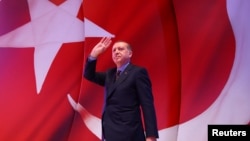Turkey accused the United Nations on Thursday of meddling in its internal politics shortly before a referendum that could give President Tayyip Erdogan
sweeping presidential powers.
In a statement earlier in the day, U.N. rights experts said Turkey's security crackdown after a failed coup attempt in July had undermined the chance for informed debate on the referendum.
They said a state of emergency imposed after the abortive putsch had been used to justify repressive measures that might well intensify if Erdogan's powers are enhanced.
Turkish Foreign Ministry spokesman Huseyin Muftuoglu said the U.N. statement was "worrisome" and its timing indicated a deliberate political approach ahead of the referendum.
"The fact that the statement came right before the April 16 public vote and contained political comments strengthens the view that this approach is deliberate," Muftuoglu said in a statement. He said Turkey was calling on the United Nations to continue constructive dialogue and cooperation.
The security clampdown since the coup attempt has seen more than 100,000 people from a wide range of professions sacked or dismissed and scores of media outlets closed.
It has raised concern among democracy and rights groups and Turkey's Western allies but the government argues the purges are justified by the extent of the threat to the state on July.
Sunday's referendum has polarized the nation. The changes could replace the country's parliamentary system with an executive presidency, marking the biggest change in Turkey's political system in its modern history.
A narrow majority of Turks will vote "Yes" in the referendum, two opinion polls showed on Thursday.
Erdogan and his supporters argue that strengthening the presidency would avert instability associated with coalition governments, at a time when Turkey faces major security threats from Islamist and Kurdish militants.
His critics fear a further drift into authoritarianism under a leader they regard as bent on eroding modern Turkey's democracy and secular foundations.





